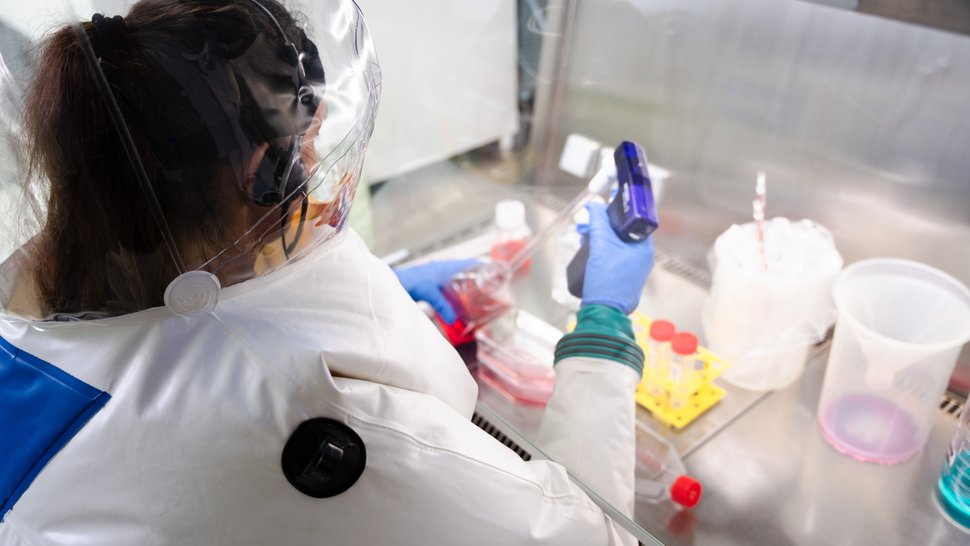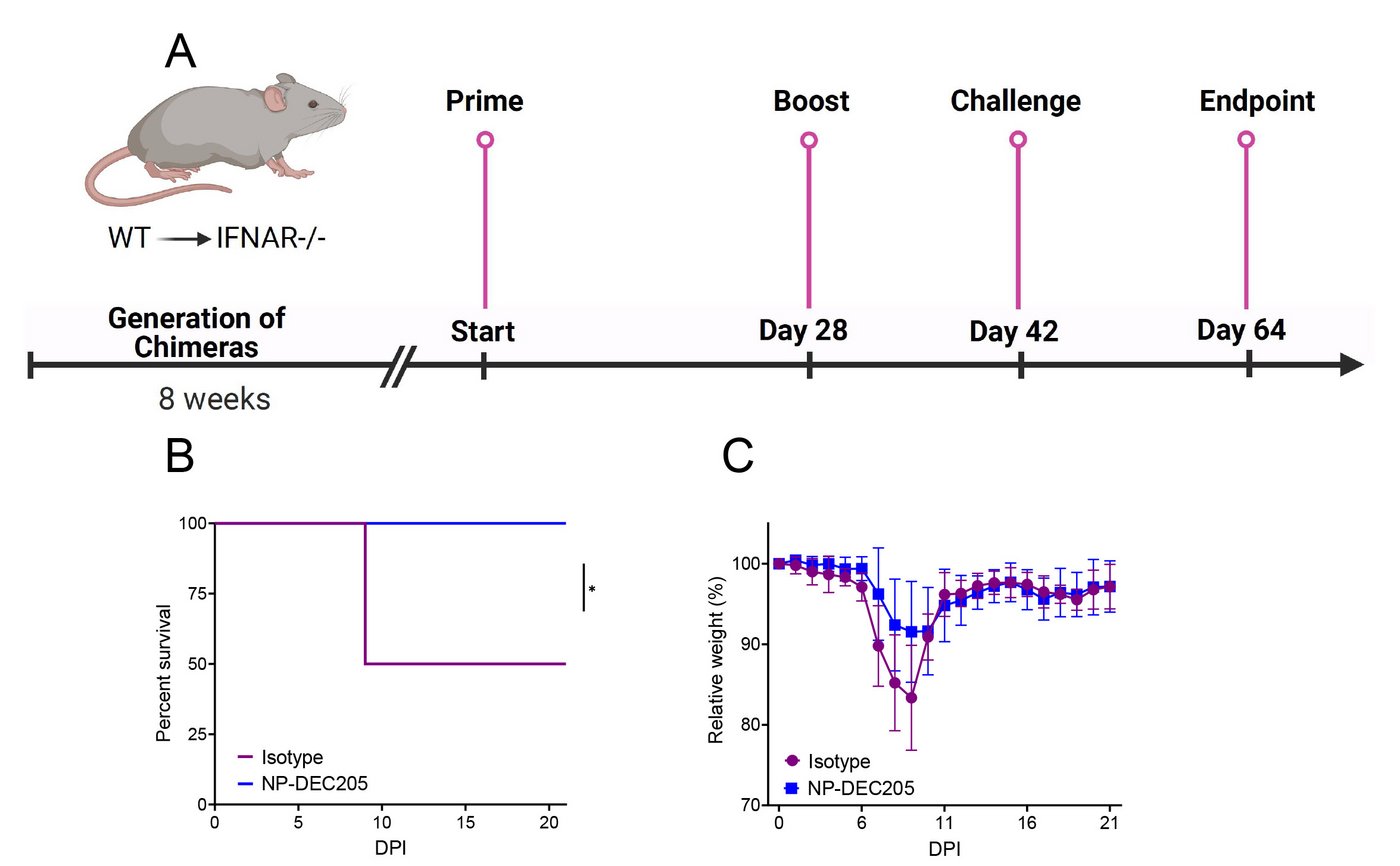New vaccine strategy against Ebola
Focus on dendritic cells
Researchers at the Bernhard Nocht Institute for Tropical Medicine (BNITM) tested a new vaccination strategy against the Ebola virus in a mouse model. They specifically targeted dendritic cells that induced a protective T cell response against the Ebola virus. In another study, the scientists characterised different populations of dendritic cells in a cell culture model to elucidate the mechanism by which excessive T cell responses occur in Ebola virus infections. The results were published in two papers in the Journal of Infectious Diseases.

Ebola viruses cause Ebola virus disease in humans: symptoms include fever, aching limbs, vomiting, diarrhea and internal and external bleeding (= hemorrhages). The first drugs that specifically target the Ebola virus have been available since 2020. However, the symptoms are still the main focus of treatment. Depending on the species of the Ebola virus and the medical care and treatment provided, between 30 and 90 percent of those infected die. This makes prevention all the more important.
Two approved Ebola vaccines are available, but they are only effective against the Zaire Ebola virus, one of the five types of Ebola virus. These are live or vector-based vaccines that induce both a humoral immune response (antibody production by B cells) and a cellular immune response (T-cell response). The strong antibody response helps to directly neutralise the virus. The T-cell response strengthens the immune memory and activates the immune response more quickly in the event of future infections. The duration of protection provided by the two vaccinations is still being studied.

"The so-called CD8 T cells play a crucial role in the human immune response against the Ebola virus. We wanted to test whether we could use a new vaccination strategy to target this T-cell population more specifically and effectively than with conventional vaccinations, and whether this would have a beneficial effect on the defence against the Ebola virus," explains Prof. César Muñoz-Fontela, research group leader of the Virus Immunology Group at the BNITM.
Most people are not immune to the Ebola virus; the immune system first has to "get to know" the Ebola virus. Antigen-presenting cells are important in this process – they present antigens, which are small viral fragments, to the T cells on their cell surface. T cells recognise antigens via a T cell receptor. Auxiliary proteins such as the protein CD8 (= cluster of differentiation 8) are necessary for T cells to bind stably to antigen-presenting cells. Once the CD8 T cells have become familiar with Ebola virus fragments, they can identify and kill other cells infected with the Ebola virus. "A robust, but also well-regulated T cell response is essential for the survival of Ebola patients," says virologist Muñoz-Fontela.
Conventional dendritic cells responsible for excessive T cell response
The key to reaching the CD8 T cells are the antigen-presenting cells. Various immune cells, including dendritic cells (DCs), can present antigens. Until now, only the behavior of one type of dendritic cells, the monocyte-derived dendritic cells (= moDCs), during Ebola virus infection was known. The Ebola virus attacks moDCs and stops their maturation. This prevents the development of a strong T cell response. However, this observation does not explain the severe forms of Ebola virus infection, in which an excessive T cell response and strong inflammatory reactions occur.
"We have observed that the Ebola virus does not attack conventional dendritic cells. Instead, it strongly activates them. This group of DCs then presents Ebola virus antigens to CD8 T cells. Our experiments suggest that the population of conventional dendritic cells may be responsible for the development of excessive T cell responses," summarises first author Dr. Linda Niemetz the results of the publication 'Ebola virus infection of Flt-3-dependent, conventional dendritic cells and antigen cross-presentation leads to high levels of T-cell activation'.
New vaccination strategy successful against Ebola virus
"Even though developing an excessive T cell response during Ebola infection is negative, we wanted to take advantage of the finding that conventional dendritic cells play a key role in this process. Based on this knowledge, we tested a new vaccination strategy against the Ebola virus," explains Muñoz-Fontela. The researchers chose the following approach: they were able to precisely target only the conventional dendritic cells (= cDCs) by using an antibody against a receptor of this cell population. The Ebola virus nucleoprotein was bound to the antibodies. The scientists wanted the cDCs to present fragments of the nucleoprotein to the T cells so that an effective T cell response against the Ebola virus could develop. The researchers' plan worked in the mouse model: they observed a robust T cell response with this vaccination strategy.
"We showed that the vaccination strategy led to protection of the mice against a severe Ebola virus infection. We were also able to detect memory T cells, which offers hope for a longer-lasting protection against the Ebola virus," says first author Dr Catherine Olal of the publication 'Antibody-based antigen delivery to dendritic cells as a vaccination strategy against Ebola virus disease'.

The nucleoprotein used by the researchers is derived from the Zaire Ebola virus. As the nucleoprotein is very similar between the species of Ebola viruses, the researchers tested whether the mice were also immune to the Sudan Ebola virus after vaccination; however, this was not the case.
"In rhesus monkeys, the strategy of using antibodies to reach dendritic cells via their specific receptor and induce T cell immunity has already been used in the context of vaccination against the simian immunodeficiency virus. This makes me optimistic that this approach could be considered for a human Ebola vaccination in the future. For example, we could use it to complement existing conventional vaccination strategies," concludes Muñoz-Fontela.
Original publications
Niemetz et al. “Ebola virus infection of Flt-3-dependent, conventional dendritic cells and antigen cross-presentation leads to high levels of T-cell activation” Journal of Infectious Diseases 2024.
(doi.org/10.1093/infdis/jiae441)
Olal et al. “Antibody-based antigen delivery to dendritic cells as a vaccination strategy against Ebola virus disease” Journal of Infectious Diseases 2025.
Contact person
Prof. Dr César Muñoz-Fontela
Research Group Leader
Phone : +49 40 285380-548
Fax : +49 40 285380-512
Email : munoz-fontela@bnitm.de
Dr Anna Hein
Public Relations
Phone : +49 40 285380-269
Email : presse@bnitm.de
Further information







